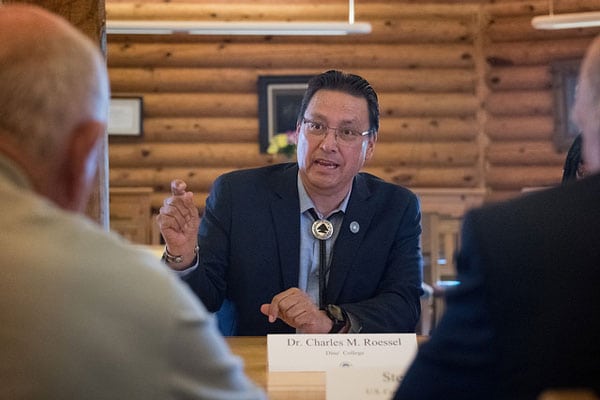
September 20, 2018; Indian Country Today
“Diné College, known as Navajo Community College before 1997, is the first and largest tribal college in the country,” writes Jourdan Bennett-Begaye for Indian Country Today.
Universities have existed in the United States since Harvard College opened in 1636, but the first college run by and for American Indians didn’t open its doors until 1968. Even then, it was a struggle.
Raymond Nakai, chair of the Navajo Nation at the time, was laughed at, Bennett-Begaye writes. A federal Bureau of Indian Affairs official, Bennett-Begaye explains, said, “You think you Navajos could run a college?” Nakai replied, “I’m not asking for permission. I’m telling you what we’re going to do.”
Nakai’s vision proved lasting. Diné College, known as Navajo Community College before 1997, is the first and largest tribal college in the country. It has 6,532 alumni to date.
The idea—notes current Diné College President Charles “Monty” Roessel—was and is to have a “higher education institution of the Navajo people, for the Navajo people by Navajo people,” Roessel’s father Robert was the first president of the college.
Classes started in 1969 with 301 students. Early days were marked with woefully inadequate facilities. Over time, that changed. “In 1973, the college moved to its new and central campus in Tsaile, Arizona…after that, the college expanded to five other campuses in Arizona and New Mexico,” Bennett-Begaye writes.
Sign up for our free newsletters
Subscribe to NPQ's newsletters to have our top stories delivered directly to your inbox.
By signing up, you agree to our privacy policy and terms of use, and to receive messages from NPQ and our partners.
President Lionel Bordeaux of Sinte Gleska University, a Rosebud Sioux tribal college in South Dakota, tells a similar story regarding his school’s founding.
One time, a US congressional representative told us that our pursuit of tribal colleges was to be respected, but that it was wrong. He said, “You Indians are good with your hands, stick to the arts and crafts. If you really want to do something meaningful, flood your reservations with chicken coops and hog pens. That’s your future!”
What difference does an American Indian–controlled college make? The short answer is, “a lot.” Historian Peter Iverson, who was among the first to teach at Diné College (he was on the college’s faculty from 1969 to 1972), notes that the college offered courses on American Indian affairs, American Indian economic development, urban American Indians, American Indian-white relations, and American Indian law and government at a time when few did. Speakers like Vine Deloria, Jr.—famed author of Custer Died for Your Sins—were among those who spoke at the college.
When Dr. Ned Hatathli, the college president from 1969 to 1972, was asked to explain the difference between a regular college and a tribal college, he said, “For one thing, we don’t teach that Columbus discovered America.” It isn’t just the classes that are different at tribal colleges, though. American Indian colleges have become a cornerstone of what has become a broad-based cultural revival in Indian Country. They have also helped build a college-educated cohort among American Indians.
As Cheryl Crazy Bull, President and CEO of the American Indian College Fund wrote, tribal colleges and universities “have become a powerful force for educating American Indian/Alaskan Native students and preserving Tribal culture. Out of the 34 Title IV-participating [tribal colleges and universities], 12 conferred bachelor’s degrees in 2012. These 12 institutions awarded 252 (88.4 percent of their total bachelor’s degrees) to American Indian or Alaska Native peoples,” according to 2014 national education statistics.
Today, Diné has 1,535 students on six campuses and 62 faculty members. Of those 62 faculty, 35 (56.5 percent) are Navajo. Originally a community college, Diné College students are now able to obtain both associate’s and bachelor’s degrees in 16 subject areas and 20 specialties. This month, the school is adding a bachelor’s degree program in Diné Studies (Diné means “Navajo” in the Navajo tongue), and the school is also on track to establish a law school program. Diné College, Bennett-Begaye observes, has become a model for the 38 tribal colleges and universities that operate today.
For his part, Roessel notes that Diné College does not tell a story about the “glory of the United States.” Roessel explains, “This is a different story. We have an opportunity. We don’t live in two worlds, we live in a blended world. We’re trying hard to prepare our students for that.”—Steve Dubb













